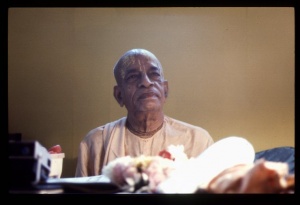SB 1.10.28 (1964)

A.C. Bhaktivedanta Swami Prabhupada
TEXT No. 28
- Nunam brata snanhutadina iswarah
- Samarchito hi asya grihitapahibhih
- Pivanti yad sakhi adharamritam muhuh
- Brajastriyah sammumuhur yadasaya.
ENGLISH SYNONYMS
Nunam—certainly in the previous birth, Brata—vow, Snana—bath, Huta—sacrifice in the fire, Adina—by all these, Iswarah—the personality of Godhead, Samarchito—perfectly worshipped, Hi—certainly, Asya—His, Grihitapanibhih—by the married wives, Pivanti—relishes, Yah—those who, Brajastriyah—the damsels of Brajabhumi, Sammumuhur—often fainted, Yadasayah—expectant for being favored in that way.
TRANSLATION
Oh my friends, just think of His wives, whose hands He has accepted; how much must they have had undergone vows, bath, sacrifice in the fire for perfectly worhipping this Lord of the universe as result of which they are now constantly relishing the nectar from His lips (by kissing). The damsels of Brajabhumi would faint often being expectant of such favors.
PURPORT
Religious rites prescribed in the scriptures are meant for purifying mundane qualities of the conditioned souls and thus becoming gradually promoted to the stage of rendering transcendental service unto the Supreme Lord. Attainment of this stage of pure spiritual life is the highest perfection and the stage is called Swarupa or factual identity of the living being. Liberation means to renovate this stage of Swarupa and in that perfect stage of Swarupa the living being is established in five phases of loving service of which the stage of service as between husband and wife is called Madhurya Rasa or in the humour of conjugal love. The Lord is always perfect in Himself and as such He has no hankering for Himself. He, however, becomes a master, a friend, a son or a husband in terms of fulfilling the intense love of the devotee concerned. Herein two classes of devotees of the Lord are mentioned in the stage of conjugal love. One is Swakiya and the other is Parakiya. Both of them are in connection with conjugal love with the Personality of Godhead Krishna. The queens at Dwarka were Swakiya or duly married wives but the damsels of the Braja were young friends of the Lord while He was unmarried. The Lord stayed at Vrindaban till His age of sixteen and His friendly relation with the neighbouring girls were in terms of Parakiya. These girls as well as the queens both underwent severe penances in taking vows, bathing, offering sacrifice in the fire as they are prescribed in the scriptures; as purificatory rites. The rites, as they are, are not end in themselves neither fruitive action culture of knowledge or achieving perfection in mystic powers are end in themselves. They are all means to attain to the highest stage of Swarupa for rendering one's constitutional service transcendental to the Lord. Each and every living being has his individual position in either of the above mentioned five different kinds of reciprocating means with the Lord and in one's pure spiritual form of Swarupa the relation becomes manifest without any mundane affinity. The kissing of the Lord either for His wives or for His young girl friends who aspired to have the Lord as their fiance is not of any mundance perverted quality. Had such things been of any mundane quality a liberated soul like Sukdeva would not have taken the trouble of relishing them neither Lord Sri Chaitanya Mahaprabhu would have been inclined to participate in those subject after His renouncing the worldly life. The stage is earned after many birth's prosecution of penances.